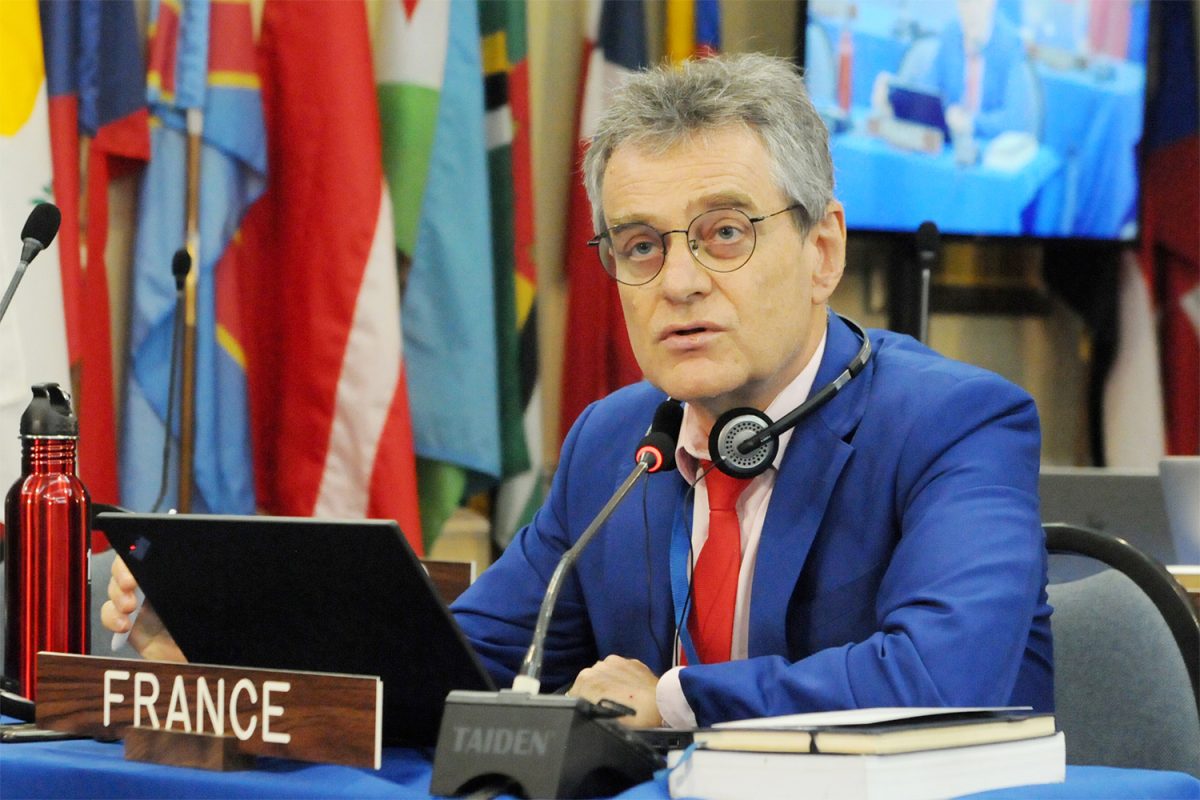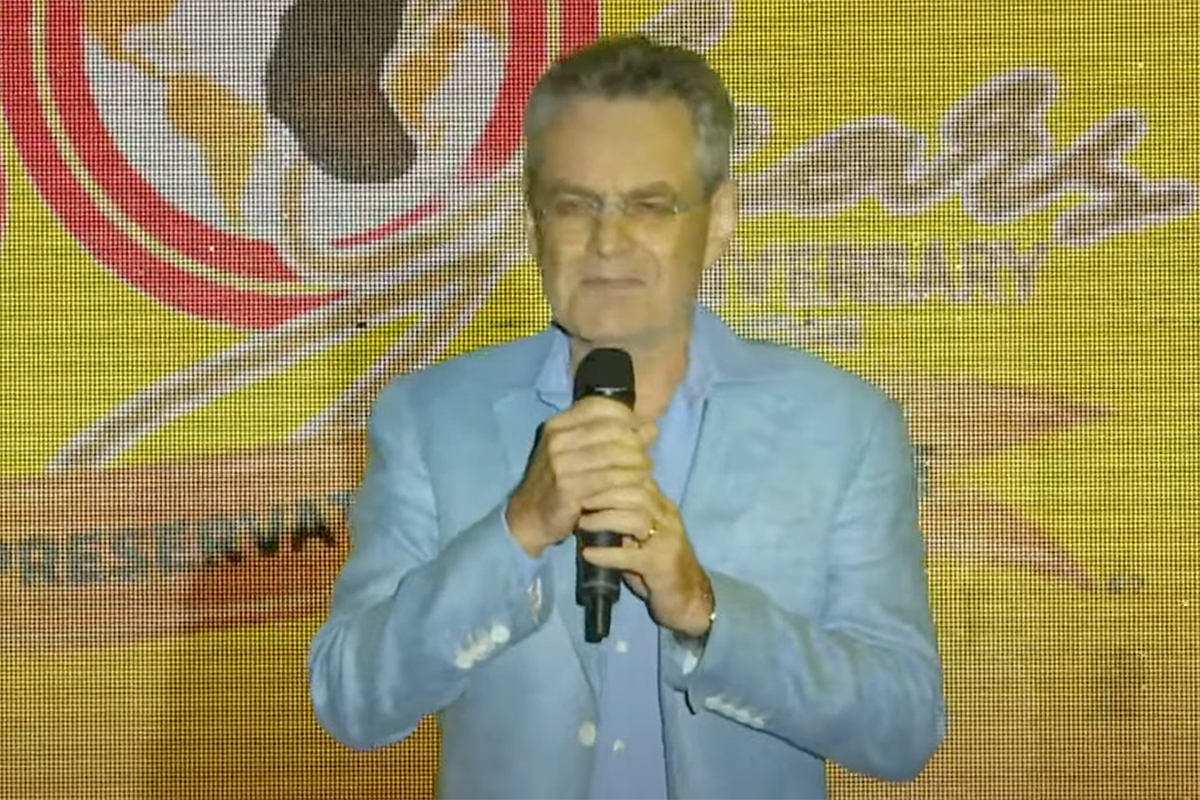French Ambassador Olivier Guyonvarch Says France Is World’s No 2. Reggae Country

Moments after stepping onto the Rebel Salute launch stage on Thursday, tearing up his scripted speech and setting it aside, French Ambassador Olivier Guyonvarch declared that his homeland is the No. 2 Reggae country on the planet.
Guyonvarch, who has been the Ambassador of France in Jamaica since October 2021, said that he wished to speak from his heart like Rastafarians do.
“I do not pretend to be a Rastafari myself, but I must respect Rastafari. When you speak to Rastafari you speak with your heart. You don’t speak with your brain. So no need for speech,” he said.
“I am very happy to be here tonight because you could say France is the second county in the world for Reggae. The French, we love Reggae. Since the 70s Reggae was popular in France. And as a teenager who had a lot of friends who have a poster of Bob Marley in our bedrooms, and I can tell you man, Bob Marley in France is an icon,” he added.
Like the feeling described by Peter Tosh in his 1981 song Reggaemylitis , where the music traveled through his bones, his upper and lower extremities, blood, brain, and other organs, the Frenchman said he did not listen to Reggae with his ears, but with all parts of his body.

“Some people believe that you listen to Reggae with what? With your ears. No I don’t think so. You don’t listen Reggae with your ears. You don’t even listen Reggae with your heart because Reggae is so powerful that your heart needs the assistance of the whole body to be able to listen to Reggae,” Guyonvarch said.
“To me, you listen to Reggae first, with your belly. Reggae grows in your belly like a little baby. Then Reggae goes down to your legs and then you start to dance. And then Reggae comes back again through your belly and go up to your heart, go to your lungs and you breathe Reggae,” he added.
Continued the Ambassador: “Reggae is part of your life. Yeah man! The Reggae goes up to your brain. Oh man, when Reggae comes, brain doesn’t know what to do. So much reggae so much vibes, so much life at the same time. And messages, messages for brotherhood; messages for freedom. Yeah man! So then your whole body listens to Reggae…”
In the early 2010s, word began to surface that France was the new Reggae Capital of the world, to the chagrin of furious Jamaicans. However, those suggestions seemingly got jettisoned with the emergence of the Reggae Revival Movement.
Jamaica’s Reggae Revival Movement, with Chronixx, Protoje, Iba Mahr, Jesse Royal, Kabaka Pyramid and Jah9, began to breathe life into what many had described as a dying genre, which was losing its appeal and was no longer capable of captivating young people who were moving towards hip hop and trap music.
At the time, the style of music, which essentially infused elements of 1980s Dancehall into Roots Rock Reggae, was considered a breath of fresh air from the abrasiveness that had taken a stranglehold on Dancehall, as the lyrics were aimed at spreading positivity as well and shedding light on the social ills of Jamaican society.
Back in July 2012, entertainment lawyer Lloyd Stanbury had opined that Jamaica had lost its status as the capital of Reggae, as many other countries and cities were performing better than Jamaica where the genre was concerned.
“Jamaica is not the capital of reggae … various places have claimed to be and they have various reasons to state their claim,” Stanbury had told The Gleaner at the time.
According to Stanbury, among those laying claim as Reggae’s capital was Abidjan, the former capital of Cote d’Ivoire in West Africa. He had explained that he was conducting a music workshop in the Ivory Coast when he was “enlightened by the locals that they were the new capital”.
“I was there for a couple weeks to conduct a music workshop and I was invited to go to a live reggae club. During my stay, they told me about some of their artistes who are successful reggae artistes internationally, and because of the success of such artistes they believe they are the capital of reggae,” he had said.
Stanbury had also told The Gleaner that Reggae Sumfest too, was neither the biggest nor the greatest Reggae show in the world, as the “greatest reggae shows in the world” were Reggae Summer Jam in Cologne, Germany, and Spain’s Rototom Sunsplash.
Jamaica, he had said, met only one criteria that could enable it to claim to being the Reggae capital and that was the fact that the island produces the most Reggae music per capita.
“But if we are looking at which place has the most reggae available, such as live shows, it would have to be France, and if we are looking at the size of the festivals, it would have to be Germany. Jamaica only has two festivals, which are Reggae Sumfest and Rebel Salute, and one of them is a one-day show…,” Stanbury said.
“We don’t value our own things. We devalue our product and allow outsiders to pick them up. As Jamaicans, we prefer foreign things, and that is our problem. When you visit Jamaica, you can’t find anywhere for live reggae music, the government and the private sector have not put enough things in place to develop the music, yet the Jamaican government, through the tourism industry, invested US$450,000 with a promoter who was promoting a foreign show to get Celine Dion to perform, and they won’t do the same to develop Reggae music,” he said.
In February this year, Pastor of the Fellowship Tabernacle in Kingston, Reverend Al Miller, had commented on what some have deemed the expropriation of Reggae by foreign countries such as France.
“Yuh si all di millions weh di French man dem a meck outta di Reggae an we naw meck none. Come on man meck wi face it… “Mi hear seh all when yuh guh a Japan… when yuh hear how much millions Japan a meck outta di Reggae. All di Chiney man dem een pan it too. How much di French a meck outta Reggae; an how much we a meck? ‘Gwaan hol a smalls’,” the pastor had said.
However, Entertainment and Culture Minister Olivia Grange, during that same month, had assured Jamaicans that Reggae cannot be “taken away” from the country, as it is safeguarded under UNESCO’s Representative List of the Intangible Cultural Heritage of Humanity, and so there is no need for foreign Reggae creators to be viewed with disdain.
In responding to questions in a Television Jamaica interview regarding the fact that Europeans, Americans, and Africans are filling the void “since the requests for positive music are falling on deaf ears”, Grange had said that Jamaica had given Reggae to the world.
“We had it inscribed by UNESCO on the Intangible Cultural List of Humanity…. We have penetrated all corners of the world, so if others take it and embellish it or make that much more out of it for their market, I don’t have a problem with that because nobody can take our space. Our space is our space; our music is our music. And they say imitation is the greatest compliment…,” she added.
